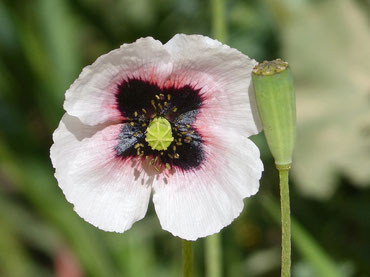BReadseed Poppy
Papaver somniferum

The seed of the breadseed poppy (also called opium poppy) contains several alkaloids, namely morphine, codeine, noscapine, papaverine, and thebaine, among others.
The milky juices that bleed from a cut in an unripe breadseed poppy seed are collected and dried to make opium - which is a highly addictive drug on its own, as well
as a precursor to heroin other strongly narcotic drugs. It is also the primary source of morphine, which, as an analgesic, acts directly on the central nervous system
to suppress the feeling of pain.
Alkaloids in general have a wide range of applications both in traditional medicine and in modern medicine. They can not only be analgesic, but also anti-asthmatic, anti-bacterial, or cure dysentery and diarrhea. Many alkaloids are also highly addictive and toxic. Both morphine and codeine are strong pain killers, and codeine is used in modern medicine as a cough suppressor and to tread diarrhea. Thebaine is a pain killer that is chemically similar to morphine and codeine, though its effect is stimulating rather than tranquilizing. Papaverine and noscapine have antispasmodic (cramp-relieving) and cough-suppressing effects, respectively.
The combined effects of its ingredients makes breadseed poppy a powerful - if dangerous - tool in an herbwoman's arsenal. Extreme caution in its use is imperative, but in the absent of modern synthetic analgetics, it is the one remedy an herbwoman has that will work against debilitating pain.
Links
Breadseed Poppy in Modern Herbal Medicine:
- Since opium, the drug won from the unripe seeds of the breadseed poppy, is a restricted substance, the plant is not used in modern herbal medicine per se. However, Wikipedia states that it is the primary source of morphine, and several other alkaloids contained in its seeds are refined from the breadseed poppy, as well.
- Wikipedia also has articles on the different alkaloids contained in opium, e.g. morphine, codeine, and thebaine, as well as opium itself.
Breadseed Poppy in Fiction:
- In her novel "Once Upon a Marquess", romance author Courtney Milan's hero fights his addiction to laudanum, i.e. tincture of opium.
- Laudanum is an often-cited remedy in many other historical romances, as well.
Blog Posts
Remedies from Regency Romances: Laudanum

There was a time in my reading career when I devoured every regency romance I could get my hands on. Georgette Heyer is still among my favorite authors. For the longest time, I read about ladies clutching their smelling salts in one hand, and a bottle of laudanum in the other, without ever realizing just what that harmless-seeming potion really was: A tincture made from the juices (latex) gained from unripe breadseed poppy (Papaver somniferum) seeds.
I may have been the only person in the world who hadn't known that, but I was fairly astonished to find out that laudanum is nothing other than opium, desolved in strong
alcohol. No wonder those high-strung imaginary ladies slept like the dead after taking a dose of their little potion!
Opium latex contains a high percentage of morphine, a highly addictive analgesic (pain killer) which acts directly on the central nervous system. It lowers blood pressure and makes the user drowsy as a side effect.
Opium also works against diarrhea, and has a depressant effect on the respiratory system. It is sometimes prescribed as a cough suppressor. An overdose can completely paralyze the lungs, though, so it must be used with extreme caution.
*** Please note: This blog is not intended as medical advice. ***
Do not try this at home.
(Or at least, don't use any of the remedies described here this without consulting your physician first.)
